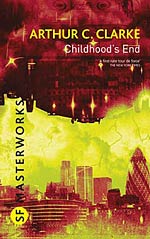
![]() BigEnk
BigEnk
3/31/2025
![]()
Kind of a mixed bag for me, but certainly has way more positives than negatives. Let's get the negatives out of the way first.
First, as to be expected of a sci-fi work of this period, the characters exist solely to serve the plot and the ideas. They are hollow, forgettable shells of real humans. The characters favor heavily towards white and male, which is again expected, though harder to forgive each passing year. Some of the technological ideas feel a little dated, but some of Clarke's predictions are solid. I also found that the middle of the book sags far below the beginning and the end, in terms of excitement, idea exploration, and good writing.
The ideas themselves are interesting. Clarke explores first contact through an interesting lens, one of quiet benevolence/ambivalence on the part of the invading aliens. The first two thirds of book postulate the value of a utopia if it leaves humanity without agency over their own destiny. The final third is the real stunner, in which humanity elevates itself to a higher form of consciousness in which they have no need for their physical bodies, or for that matter, Earth itself. The aliens reveal themselves to be but mere stewards of this change, employed by the higher power that humanity will eventually join in some other plane of existence. Clarke asks the reader what the real value of humanity could be, and what we would find as a satisfying conclusion to our race. Really fantastic stuff, especially for something so old. The opening and closing ~40 pages are both really great. Clarke doesn't hold his punches either. Most of these reveals are dropped in quick succession, but don't feel rushed.
I'm really happy to have read this one. I think it will provide an excellent watermark for future readings in science fiction. I would compare it to City by Simack in a lot of ways, and I hold both in high regard.